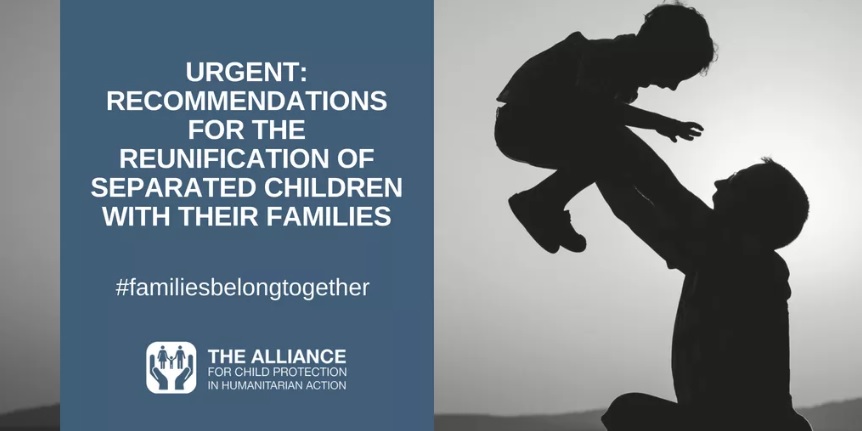
Over a five-week period, at least 2,300 children were separated from their families at the southern US border. The recent executive order seeks to end family separation through family detention. Children are now being detained with their families at the same processing centers. Separation is still possible as these children cannot be legally detained beyond 20 days**, while the time required to process asylum claims or immigration proceedings is significantly longer.
The Alliance for Child Protection in Humanitarian Action has recently released an advocacy brief including technical recommendations for immediate reunification of children separated from their caregivers as well as an end to detention of families. The IBCR has signed this campaign and fully endorses these recommendations.
Recommendation 1: Facilitate rapid family reunification
- Through an expanded task force on reunification of unaccompanied children, coordinate with all relevant government agencies and child welfare actors for the rapid identification, documentation, tracing, and reunification of separated children.
- Ensure Standard Operating Procedures are in place that delineate roles and responsibilities (functional and geographic) of those involved in the care, reunification and legal status determination of separated children. These should include strengthened information-sharing protocols, case management systems that address the individual needs of children and their families, and coordination of program activities.
- Partner with relevant civil society organizations to facilitate rapid family reunification.
- Link children’s and their families’ claims in court so they are processed together.
- Respect the rights of parents and children to select their preferred reunification plan.
- Keep separated siblings together and avoid moving them far from their caregivers.
Recommendation 2: Provide mental health and psychosocial support to children and their families
- Ensure daily contact between children and families and prepare them for reunification.
- Strengthen access to child-appropriate mental health and psychosocial support services.
- Update children, families, and caregivers — especially if they are detained – on their cases through appropriate platforms in a timely, safe, accessible, and age and gender appropriate manner.
Recommendation 3: Ensure administrative and legal procedures meet the best interests of the child
- Limit children’s exposure to processing centers, detention or institutional care facilities.
- Ensure that all personnel who interact with children are appropriately trained in disability – and age–appropriate, gender–sensitive, trauma-informed care and support.
- Establish and adhere to administrative and legal procedures that treat separated children in a non-discriminatory, age-appropriate and trauma – informed manner.
- Provide children and their families with access to timely legal representation, including post-detention.
- Update children and their families using means of communication that are appropriate to their age, gender and disability.
Recommendation 4: Prevent further family separation by ending the use of detention
- Provide non-custodial, community-based alternatives to detention that support family unity and reflect the family’s changing needs as their cases proceed.
- Place all children awaiting reunification in family-based care in the least restrictive setting possible, where their best interests are a primary consideration.
- At all times, ensure children have access to adequate food, shelter, health care, rest, educational, social and recreational activities, daily contact with family members, and professional psychosocial and legal services.
** The 20 days refers to detention in secure, unlicensed facilities.



